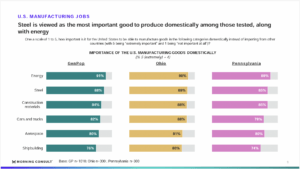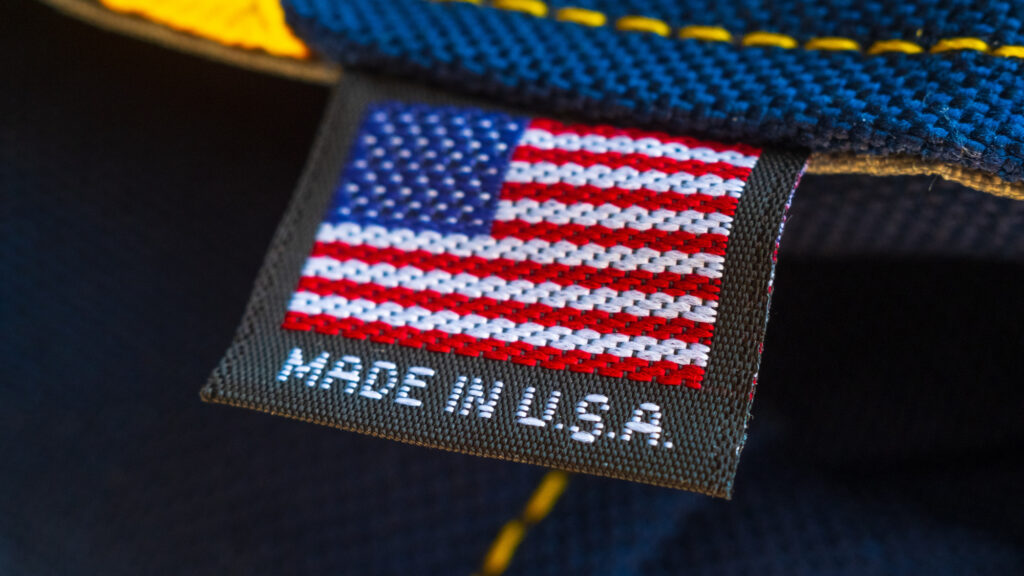A poll of Republican voters conducted by Morning Consult for Alliance for American Manufacturing showed that 46% of respondents believed tariffs imposed by the previous government should remain – namely the Section 201 solar safeguards and Section 301s against China, and the Section 232 global steel and aluminum tariffs. Some 45% said the tariffs should be higher. And if those numbers seem low, it’s worth noting that only 10% said tariffs should be reduced or eliminated entirely.
The poll targeted Republican primary voters, with an overweight of voters in the manufacturing and steel states of Ohio and Pennsylvania. Only 6% of Ohio voters said tariffs should come off, with 8% of Pennsylvania voters saying the same.
In a nod to the worker-centered trade policies espoused by the Biden administration and USTR Katherine Tai, 75% of respondents said the next President should put the needs of American workers first when pursuing trade policies. Only 18% said the next President should be a big free trader.
“We need a different approach to trade,” Katherine Tai said on Oct. 11 at an event in Washington held by the Center for American Progress. “Not trickle-down economics in trade form; not maximum tariff liberalization that contributed to the hollowing out of our industrial heartland.”
Although the poll was geared towards hearing out Republicans, the Biden administration has already honed in on these issues, with Tai being the one to “sell it” on Capitol Hill, Politico reported this summer.
Tai is among the leading voices in the Biden administration contending the change is necessary to help U.S. workers, combat supply chain disruptions and counter an increasingly assertive China. She’s under increasing pressure to sell this shift as Biden launches his reelection bid, where it’s critical he shows his trade agenda delivers for U.S. workers in the ways he has promised. The country’s economic outlook will be front of mind for voters and a top target for his Republican challenger — potentially former President Donald Trump, whose criticism of free trade helped propel him to the White House in 2016. – “Biden’s trade experiment is ticking people off. His trade rep is on the receiving end,” by Steven Overly and Doug Palmer, Politico, July 7, 2023.
On issues like infrastructure, something Biden signed into law with the Bipartisan Infrastructure Law last year, 85% support federal investment into infrastructure. Another 86% said that government money spent on infrastructure improvements and new projects should go to American-manufacturers. A vast majority of Republican voters, 81%, said they agreed that the government “is purchasing too many foreign made goods over U.S. products.”
In fact, government purchasing of overseas goods came in ahead of cheaper labor costs as one of the main reasons why Republican voters believe manufacturing jobs are cut at home. Some 68% said trade agreements led to manufacturing job loss.
Republican voters responding to MorningConsult were also supportive of tax incentives to help reshore manufacturing. Tax incentives were a big part of the Inflation Reduction Act, which targets clean energy supply chains like solar. Some 84% of respondents said they either strongly supported, or somewhat supported tax incentives for local producers.
The poll singled out six manufacturing sectors to see which ones ranked highest in terms of Republican voters’ support for domestic production. Energy was no. 1, followed by steel.
 On the China front, four-in-five GOP voters believe that China is beating the United States in manufacturing, with 28% saying manufacturing jobs will never come back.
On the China front, four-in-five GOP voters believe that China is beating the United States in manufacturing, with 28% saying manufacturing jobs will never come back.
Given a range of options to deal with China’s unfair trade practices, 58% supported imposing tariffs as opposed to conventional approaches like WTO cases, more dialogue, or negotiating a bilateral trade deal.
Over the last few months there has been a growing number of financial pundits and economists writing about the failed promises of free-trade globalization. A small but growing number of eminent economists are beginning to recognize that excessive free trade can be both economically and socially destructive, as CPA chief economist Jeff Ferry noted in an article on industrial policies here. And one by Harvard economist Dani Rodrik following a similar path here.
Earlier this month, Princeton economists Anne Case and Angus Deaton wrote that the life expectancy of Americans without college degrees has been declining since 2010. They attributed the decline to “excessive health care costs, globalization, and automation” replacing labor.
While this group of economists do not all support tariffs, they all support new forms of industrial or economic policy that were barely considered a decade ago.
What are the Best Tariffs for the U.S.? Economists Say: From 14% to 60%













